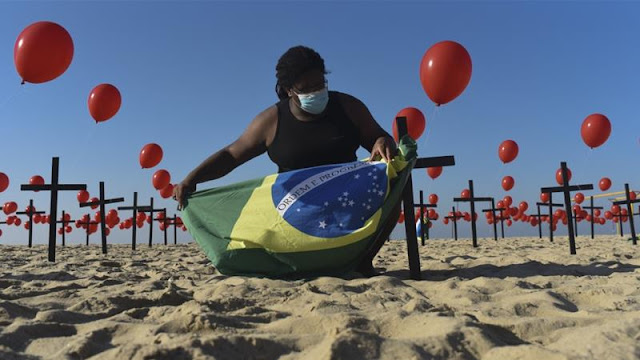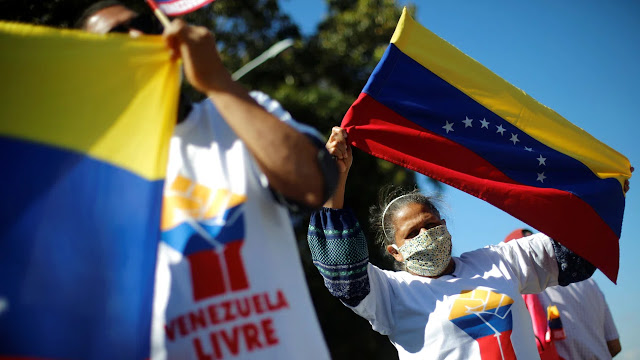Brazil's Coronavirus Nightmare
This week Brazil became the second nation to record over 100,000 deaths from Covid-19, the other being the United States. Brazil is Latin America's largest economy and is well developed by regional standards. Moreover, the nation has a history of dealing with public health crises. Only four years ago in 2016 Brazil was hit with an outbreak of Zika, a virus spread through mosquitoes that causes birth defects. Many at the time worried that Zika would spread throughout Latin America and cause harm to a generation of children. This did not happen, Brazil's health ministry worked diligently under the leadership of then President Dilma Rousseff to track outbreaks and administer care. So what's different this time around?
Almost all of Brazil's problems combating the coronavirus can be traced back to a singular event, the election of Jair Bolsonaro as President in October of 2018. Bolsonaro, a member of the far-right Social Liberal Party, defeated Fernando Haddad, a member of the center-left Workers Party, in part due to the Workers Party's history of corruption. The WP's most famous member, Lula, has been in jail for corruption since 2016 and its most recent President, the aforementioned Dilma Rousseff, was impeached on corruption charges. This made Brazil's largest party weak, opening the door for a candidate like Bolsonaro to take power. While Bolsonaro is affiliated with the PSL, he is a populist candidate at heart. He ran not on specific policies, or as an extension of a party, but rather on his charisma and personal charm.
His handling of the coronavirus has been an unmitigated disaster for Brazil for multiple reasons. Brazil has suffered from massive amounts of misinformation peddled by the Bolsonaro administration. When Brazil confirmed its first cases of the disease Bolsonaro went on record saying that it was nothing more than a "little flu". He has also been attending political rallies with no mask and hugging supporters in the audience. His actions have signaled to supporters that they do not need to take mask and social distancing recommendations seriously, thus driving up the country's cases. Unsurprisingly, Bolsonaro eventually contracted coronavirus. He recovered, and attributed his recovery to hydroxychloroquine despite warnings from the USFDA that the drug has shown no actual promise in fighting the disease and may even lead to future health risks.
Bolsonaro has also greatly weakened his Ministry of Health during the pandemic. Two separate ministers have resigned since the pandemic began. Both cited Bolsonaro's refusal to effectively combat coronavirus as a major reason for leaving. Both also mentioned that he would not listen to the advice of experts. Currently Brazil has an army General in charge of the Ministry of Health, one who has no experience in public health. This has led to a slow and ineffective response from Brazil's Ministry of Health since the beginning of the pandemic. In fact, Bolsonaro has ordered the army to produce hydroxychloroquine and have the Ministry of Health distribute it to hospitals throughout Brazil, all while Brazil is lacking in beds and ventilators.
The outbreak began in large cities like Rio de Janeiro and Sao Paulo, which led to huge spikes in the nation's caseload. However, in recent weeks metropolitan areas have seen a decline in positive tests and deaths, leading the Bolsonaro administration to reopen the economy. Part of the reason these cities have recovered is due to their health infrastructure. Large cities tend to have more hospitals and healthcare professionals to combat the virus. Overall cases in Brazil are still on the rise though. The epicenter of the virus in Brazil has transitioned from the urban coast to the rural interior of the county, and this poses a host of new challenges.
Rural Brazilian towns don't have enough doctors, clinics, or beds to deal with the increasing caseload. Towns like Altamira on the Amazon river have set up field hospitals to try and keep people alive until beds open up in municipal hospitals, which have a greater capacity for care. Most of Bolsonaro's electoral support comes from Brazil's rural interior, and health experts in the country have claimed that his posturing about the virus has greatly contributed to its spread.
Brazil's coronavirus future is uncertain but does not seem promising. While cases in the cities have gotten better, combating the virus in its rural interior is a different challenge that the country must face. Electorally the virus has already hurt Bolsonaro's poll numbers, but Covid's movement to the interior could be catastrophic for him. Without the strong support from voters in the interior states Bolsonaro would never have won in 2018, and if he loses their support now it is hard to see how he wins reelection in 2020.
- Evan
Bibliography
Andreoni, Manuela. “Coronavirus in Brazil: What You Need to Know.” New York Times, August 3, 2020. https://www.nytimes.com/article/brazil-coronavirus-cases.html.
“Coronavirus: Brazil Passes 100,000 Deaths as Outbreak Shows No Sign of Easing.” The BBC, August 9, 2020. https://www.bbc.com/news/world-latin-america-53712087.
“Coronavirus Cases, Deaths on the Rise in Brazil and Mexico.” Al Jazeera, August 10, 2020. https://www.aljazeera.com/news/2020/08/coronavirus-cases-deaths-rise-brazil-mexico-200810071724113.html.
“Coronavirus Tracker .” World O Meter . Accessed August 11, 2020. https://www.worldometers.info/coronavirus/#countries.
Pedroso, Rodrigo, Fernanda Wenzel, and Thaize Oliveira. “Brazil Passes 100,000 Covid-19 Deaths, as Cases Top 3 Million.” CNN, August 9, 2020. https://www.cnn.com/2020/08/08/world/brazil-covid-19-deaths-intl/index.html.
Philips , Dom. “Brazil’s Coronavirus Catastrophe Is Spreading Into The Country’s Vulnerable Interior .” The Intercept, July 21, 2020. https://theintercept.com/2020/07/21/coronavirus-brazil-interior-bolsonaro/.






Comments
Post a Comment